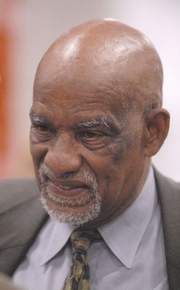Assembly Transpo Committee Kills Bus Lane Enforcement Bill
 Legislation central to New York City’s implementation of Bus Rapid Transit died in Albany yesterday, when the State Assembly transportation committee, chaired by Rochester Democrat David Gantt (right), defeated a bill authorizing bus-mounted enforcement cameras by a narrow 14-11 vote. Another traffic enforcement bill, which makes it easier to issue tickets for blocking the box, did make it through the committee.
Legislation central to New York City’s implementation of Bus Rapid Transit died in Albany yesterday, when the State Assembly transportation committee, chaired by Rochester Democrat David Gantt (right), defeated a bill authorizing bus-mounted enforcement cameras by a narrow 14-11 vote. Another traffic enforcement bill, which makes it easier to issue tickets for blocking the box, did make it through the committee.
"It’s really outrageous that after a year of pretty unanimous agreement about New York’s congestion problem, that all we’re left with is don’t block the box," said Wiley Norvell of Transportation Alternatives. "It’s pretty sad when that’s the best Albany can do."
Without bus-mounted enforcement cameras, which have proven successful in London, getting transit up to speed on DOT’s five planned BRT routes faces significant hurdles. "It’s going to make it a lot harder to move buses faster through the city,
without camera enforcement of the lanes," said Gene Russianoff of the Straphangers Campaign. "It’s going to hurt this
experiment with Select Bus Service."
Transit and environmental advocates arrived at the state capitol yesterday optimistic that the bill, introduced by Manhattan Democrat Jonathan Bing, would get through committee. "We had the votes, we had the support, especially from Assemblyman Bing, who
put in a lot of effort," said Josh Nachowitz of the New York League of Conservation Voters. "Unfortunately, the chairman was completely
opposed to it, and used the legislative process to send it to defeat."
Bills authorizing automated enforcement have met resistance from Gantt in the past, but there were signs his stance had changed recently. Last month the assemblyman introduced a bill that would expand the use of red-light cameras in counties outside New York City. However, as several news outlets noted, that bill appeared crafted to benefit a specific vendor that employs one of Gantt’s former aides as a lobbyist. The bus camera bill contains no such language.
Gantt’s office has not returned Streetsblog’s requests for comment. According to advocates, when pressed to explain his opposition to the bill, Gantt cited concerns about privacy and implied that bus-mounted cameras were intended mainly to generate revenue. As the Daily News pointed out this morning, that reasoning appears increasingly flimsy.
City officials and supporters of the bill had worked closely with the New York Civil Liberties Union to address privacy issues. The bill the committee voted on included restrictions on the direction cameras can face, and the length of time images can be stored. Those steps garnered the blessing of the NYCLU.
To cite privacy concerns at this point indicates that a double standard is at work. "There are millions of transit riders in the subway system who are
watched by cameras on a daily basis," said Nachowitz. "Why should drivers get a free pass
while transit riders are under scrutiny every day?"
As for the notion that bus cameras are a "money grab," he added, the revenue they generate would be "diminutive compared to the overall [city] budget."
In addition to Bing, Assemblywoman Joan Millman of Brooklyn voted in
favor of the bill. The full roll call is still unclear, however, due in
part to the way Gantt held the vote. "There was no
debate or discussion," reported Russianoff. "It was a quick show of hands."
Nachowitz expects the measure to come up again in the legislature, citing the close vote as evidence that lawmakers are more aware of the need for automated traffic enforcement.
The message transit riders will take away for the time being, however, is sobering. "Everyone says they care about bus riders, but the proof is in the pudding," said Norvell. "This is a real slap in the face to New York City bus riders, and not the first they’ve taken from Albany this year."
Photo: Democrat and Chronicle